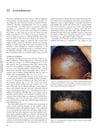 2 citations,
January 2023 in “Journal of Education, Health and Sport”
2 citations,
January 2023 in “Journal of Education, Health and Sport” Cognitive-behavioral therapy with habit reversal training is the most effective treatment for trichotillomania.
 January 2017 in “International journal of science and research”
January 2017 in “International journal of science and research” Trichotillomania is a chronic hair-pulling disorder, more common in females, treated with therapy and sometimes medication.
 30 citations,
August 2018 in “Dermatology and Therapy”
30 citations,
August 2018 in “Dermatology and Therapy” Better-designed, long-term studies are needed to optimize treatment for trichotillomania and trichophagia.
[object Object]  April 2023 in “Our Dermatology Online”
April 2023 in “Our Dermatology Online” Trichoscopy is effective in diagnosing trichotillomania by showing specific hair patterns.
 4 citations,
January 2019 in “Clinical and Experimental Dermatology”
4 citations,
January 2019 in “Clinical and Experimental Dermatology” The review found that individualized treatment and teamwork are important for trichotillomania, and patients who followed through with treatment often improved.
 April 2012 in “Informa Healthcare eBooks”
April 2012 in “Informa Healthcare eBooks” Trichotillomania is a disorder where people compulsively pull out their hair, treated with drugs and behavior therapy.
110 citations,
January 1984 in “Progress in brain research” Gonadal hormones may influence sex differences in play fighting in animals, but their effect on human spatial behavior is unclear and needs more research.
13 citations,
March 2014 in “Journal of the American Medical Directors Association” Trichotillomania was successfully treated with risperidone and naltrexone.
8 citations,
January 2016 in “Case Reports in Psychiatry” Trichotillomania in dementia may be better treated with dopamine blockers like quetiapine than with SSRIs.
 7 citations,
May 2013 in “Optometry and vision science”
7 citations,
May 2013 in “Optometry and vision science” Bimatoprost can help regrow eyelashes in people with trichotillomania.
 5 citations,
November 2021 in “Skin appendage disorders”
5 citations,
November 2021 in “Skin appendage disorders” Hair loss can cause stress and mental health issues, so treatments should address both the physical and psychological aspects, involving a team of dermatologists, psychologists, and hair specialists.
 5 citations,
January 2020 in “The mental health clinician”
5 citations,
January 2020 in “The mental health clinician” Vitamin D supplements may reduce hair-pulling in people with Trichotillomania.
5 citations,
May 2015 in “JRSM open” If a child is losing a lot of eyelashes and it keeps happening, doctors should look carefully at their health history because it might be a sign of a different health problem.
 2 citations,
September 2022 in “Dermatologic therapy”
2 citations,
September 2022 in “Dermatologic therapy” Microneedling helps reduce hair-pulling and promotes hair regrowth in trichotillomania patients.
 1 citations,
July 2022 in “Movement disorders clinical practice”
1 citations,
July 2022 in “Movement disorders clinical practice” A patient with Wilson's disease showed hair-pulling behavior as an initial symptom.
 April 2024 in “Journal of applied cosmetology”
April 2024 in “Journal of applied cosmetology” Botulinum toxin shows promise for treating skin conditions but needs more research for safety and effectiveness.
 January 2018 in “Springer eBooks”
January 2018 in “Springer eBooks” Trichotillomania is a condition where people repeatedly pull out their hair, which can be triggered by stress and has various physical signs.
 January 2016 in “Springer eBooks”
January 2016 in “Springer eBooks” The conclusion is that using the 5W1H method can improve diagnosis and management of childhood hair-pulling disorder.
 October 2004 in “European Neuropsychopharmacology”
October 2004 in “European Neuropsychopharmacology” Impulsiveness is common across various psychiatric disorders and linked to many psychological symptoms.
152 citations,
December 2003 in “Micron” As people age, their hair follicles produce less pigment, leading to gray and white hair, due to factors like reduced enzyme activity and damage to melanocyte DNA.
 144 citations,
July 2015 in “Clinical, Cosmetic and Investigational Dermatology”
144 citations,
July 2015 in “Clinical, Cosmetic and Investigational Dermatology” Alopecia areata is a common autoimmune disease affecting about 2% of people, causing significant disability and often associated with mental health issues and other autoimmune conditions.
 139 citations,
February 2014 in “Journal of Advanced Research”
139 citations,
February 2014 in “Journal of Advanced Research” Vitamin D is important for skin health and may affect conditions like psoriasis and hair loss, but more research is needed to understand its role fully.
 77 citations,
June 2015 in “Nature Reviews Urology”
77 citations,
June 2015 in “Nature Reviews Urology” Some common medications can harm male fertility, but many effects can be reversed.
 63 citations,
April 2018 in “Journal of the American Academy of Dermatology”
63 citations,
April 2018 in “Journal of the American Academy of Dermatology” Topical JAK inhibitors may help treat some skin conditions but need more research.
 51 citations,
January 2014 in “Pediatric Clinics of North America”
51 citations,
January 2014 in “Pediatric Clinics of North America” The guide explains how to identify and treat children's hair loss, including fungal infections, autoimmune disorders, hairstyle changes, self-correcting conditions, and behavioral therapy for hair-pulling.
[object Object]  47 citations,
June 2011 in “Movement Disorders”
47 citations,
June 2011 in “Movement Disorders” The LRRK2-G2019S mutation in Parkinson's disease has a lifetime penetrance of 25-35%, and finasteride may help reduce symptoms in adult male Tourette syndrome patients.
 46 citations,
September 2011 in “Movement Disorders”
46 citations,
September 2011 in “Movement Disorders” Finasteride reduces Tourette syndrome symptoms, but results may be limited due to potential biases.
 42 citations,
December 2007 in “American Journal of Psychiatry”
42 citations,
December 2007 in “American Journal of Psychiatry” Finasteride may effectively reduce Tourette's syndrome symptoms and improve life quality.
 39 citations,
May 2011 in “Movement Disorders”
39 citations,
May 2011 in “Movement Disorders” Finasteride may help reduce symptoms in male Tourette syndrome patients.
 38 citations,
January 2016 in “Indian Journal of Dermatology, Venereology and Leprology”
38 citations,
January 2016 in “Indian Journal of Dermatology, Venereology and Leprology” Trichoscopy is useful for diagnosing different types of hair loss.

























